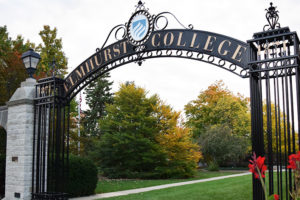
While much of the world has been embracing the ideals of competitive elections and free-market capitalism, here in the United States we’re starting to doubt whether it’s working for us the way it used to, observes national security expert and Fox News analyst KT McFarland.
“You can’t pick up a paper without reading that Washington is hopelessly divided, mired in partisanship and gridlock,” McFarland said during her lecture, Democracy and Global Security, on April 12. It’s gotten so bad that some of our leading influencers, like Thomas Friedman of The New York Times, are gazing longingly at China as a country that at least can get big things done.
But China-envy and the whiff of defeatism that hangs over our national conversation obscure all of the things that America has going for it, McFarland said to an audience of about 300 in the Founders Lounge.
“I’m not a wild-eyed optimist. I’m a pessimist by nature,” she said, but the theory of the rise and inevitable fall of some of the world’s great empires—Roman, British, Ottoman–doesn’t really apply to the U.S. “We’re uniquely blessed. We are one nation made from many. We can reinvent ourselves, re-create ourselves. Our ability to self-govern is the ability to self-correct.”
McFarland comes to this narrative through her experiences as a Cold Warrior, Oxford and M.I.T. scholar, U.S. Senate candidate, and mother of five. She held national security posts in the Nixon, Ford and Reagan administrations and worked on the staff of the U.S. Senate Armed Services Committee.
Over the course of the 20th century, she said, much of the world has worked through all of the “-isms”: fascism, communism, Islamism. Each was “a small-group oligarchy, telling people what to do.” Once they failed, Western-style democracy and capitalism came into ascendancy everywhere except the Middle East. Now, even the Arab countries are starting to make the transition.
But in Washington today, she said, “a benevolent dictatorship of wise men think they can run the country.” It won’t work, she predicted. “At the end of the day, Midwestern common sense and the ability of average Americans to choose their destiny is going to save us.”
A questioner in the audience asked McFarland for her views on future leaders of the Republican Party. She offered pithy quips on the names in play:
- On Sarah Palin: “Her moment may have passed. She won’t be a force in the future.”
- On the governor of New Jersey: “You don’t argue with Chris Christie and win.”
- On the battle to recall the governor of Wisconsin: “Scott Walker is terrific. The problem is, everybody has now noticed what he’s doing,” and labor unions and Democratic groups have poured $75 million into a recall effort.
- On the political figure she likes best: “Jeb Bush is a great national tragedy, in that he has not found a way to run.” She admired Bush for taking on “intractable issues,” such as education, when he was governor of Florida.
As for the future of the Republican Party, she’s not worried. While the U.S. Senate is “not interesting,” the House has “more promise.” “Paul Ryan is great but he’s a little boring,” she said of the House Budget Committee chairman and Medicare reformer. “I wish he’d learn not to use statistics to make his points.”
“The national candidates will come from the statehouses,” she said, and overall, “the candidates running today are not as impressive as the ones who will run tomorrow.”
McFarland’s lecture was part of the Democracy Forum, the College’s yearlong examination of the problems and promise of the American form of self-governance. Other speakers in the series have included cultural critic and sociologist Michael Eric Dyson, legal analyst and author Jeffrey Toobin, U.S. Senator Mark Kirk of Illinois, and acclaimed Harvard political scientist and author Robert Putnam. On May 17, renowned journalist Bob Woodward and Judge William J. Bauer will discuss Truth and Justice in America.